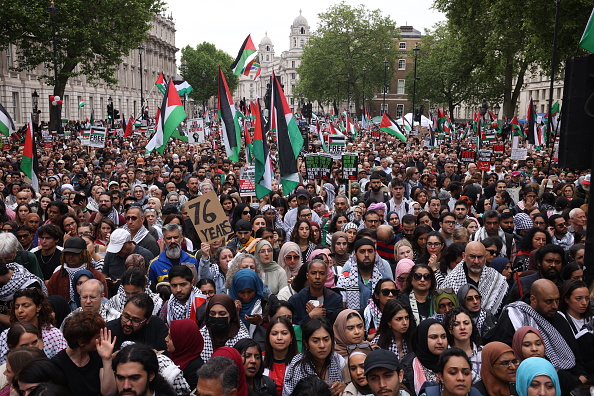Hundreds of thousands of protesters took to the streets of central London on Saturday to reiterate calls for an immediate ceasefire in Gaza and to commemorate the 76th anniversary of the Nakba.
The Nakba, meaning “catastrophe” in Arabic, refers to what many historians see as the ethnic cleansing of over 800,000 Palestinians from their homeland in 1948 during the establishment of Israel.
After seven months of sustained protests nationwide, protestors are continuing to demand politicians take decisive action to end the ongoing genocide in Gaza.
Legendary British singer Yusuf Islam, formerly known as Cat Stevens, addressed the crowds, urging continued support for the Palestinian cause and freedom.
Motaz Azaiza, a Palestinian photojournalist whose Instagram following skyrocketed to over 18 million as he documented Israel’s assault on Gaza, spoke passionately at the event. He also gave an interview on Islam Channel.
In a recent interview with Islam Channel, Chris Gunness, the former spokesperson for the United Nations Relief and Works Agency for Palestine Refugees (UNRWA), discussed the organisation’s critical work in the aftermath of the Nakba. Watch it here
UK public opinion firmly backs the Palestinian cause
The massive pro-Palestinian protests across the United Kingdom are a reflection of the prevailing public sentiment.
Contrary to assertions by pro-Israel groups that the marches do not represent the “silent majority,” recent polling data demonstrates that the majority of British public opinion is firmly aligned with the protesters’ demands.
A YouGov survey found that the desire for an immediate ceasefire is widespread, with seven in ten Britons stating that Israel should stop its military offensive and call for a cessation of hostilities. Only 13% believe Israel should continue its military action.
While Hamas recently accepted a ceasefire, Israel rejected the proposal.
The public sentiment is firmly in favour of both parties engaging in peace negotiations. A staggering 70% of Britons believe that Israel should enter into peace talks with Hamas, with only 8% opposed. Similarly, 76% say Hamas should be prepared to participate in such negotiations, with 4% dissenting.
Even among pro-Israel supporters, 58% say Israel should be willing to enter into peace negotiations with Hamas, up from 50% in February.
When it comes to sympathies, Britons are more likely to side with the Palestinian cause, with 29% expressing greater sympathy for Palestinians compared to 16% with Israel.
In recent weeks, momentum has been building for an arms embargo on Israel, with parliamentarians and legal experts calling on the UK to withhold military assistance from the country until the attacks in Gaza cease.
Most significantly, a majority of Britons (56%) would support the UK ending the sale of arms to Israel for the duration of the conflict in Gaza, with only 20% opposing such a move.
These findings underscore the depth of public support for the Palestinian cause within the UK and the growing pressure on the government to take a firm stance against Israel’s military actions and work towards a just and lasting resolution to the conflict.









